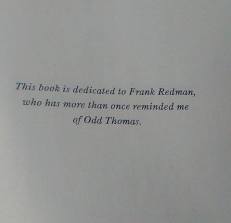I have had more thoughts about the mystery of Twin Peaks the show itself, but I wanted to explore another thought I’ve been having all season, regarding the nature of “art” versus “entertainment,” and the tension of the “artist”/”entertainer.”

 f
f
It is one thing to consider oneself an “artist” and produce work to express oneself and whatnot, without concern for profit. Even so, if you’re going to “express yourself,” you still need to use symbols that people understand. On the other end of the scale is the “entertainer,” who uses talent strictly to amuse audiences and make money. There is little reason to look on each other with mutual disdain. But most creative types, whether artists, writers, musicians, or filmmakers, operate somewhere in between, and when one operates in a mass market context, there is a certain contract at work between creator and audience. A few weeks ago, I found a blog that a younger viewer wrote several years ago, discussing how Lynch was known for completely rejecting the principle that he owed anything to audiences, and while some say that makes him a “great” director, this lady argued (and I’d agree) that that ultimately makes him a bad director.
In the 1980s, give or take, there were four great young cartoonists who often get compared to one another in terms of their impact and the extent to which they followed Charles Schulz as role models: Jim Davis, Berkeley Breathed, Gary Larson and Bill Watterson. Davis is often used by critics, fans and other cartoonists alike as the embodiment of a “sell-out”: he embraced commercialism and licensing early on. While Charles Schulz took years before he began licensing Peanuts and allowing the animated spin-offs, which he carefully supervised, Davis recognized Garfield as a cash cow (cash cat) and cashed in, maintaining a similar legal control to that which Schulz enjoyed but generally allowing a great deal of flexibility.. On the other extreme was Watterson: who introduced the world to Calvin and Hobbes in 1985, consistently refused merchandising or animation, and suddenly retired after 10 years, saying he’d said all he needed to say and becoming something of a reputed recluse (though those who know him say he just kept such anonymity in his career that no one knows who he is when he’s out and about), occasionally popping up for guest stints at other comics or writing a public message here and there.
Somewhere in between is Breathed, who has “retired” several times–Bloom County became Outland originally so he could do Sunday’s only and supposedly have more creativity; Outland became Opus as he reverted back to form but still wanted to keep an episodic format. And a few years ago, he made another comeback, reviving Bloom County as a webcomic posted at his leisure, sometimes in color, sometimes B&W, sometimes a mix, and exploring whatever topics he wants unencumbered by the constraints of syndicates and newspapers. Breathed, like Davis, embraced, and continues to embrace, merchandising but kept more creative control and, other than one or two outings, has never embraced animation. He’s also explored screenwriting and children’s literature.
I see a certain parallel at work in the directorial careers of George Lucas and David Lynch. Both are known as young directors who showed promise straight out of film school in the 70s. Both are known for exploring New Age/Neo-Gnostic/Pseudo-Eastern mysticism/philosophy in their works. Indeed, David Lynch was almost the director of Return of the Jedi. However, many critics and fans might balk at the comparison, since Lucas is to Lynch as Davis is to Watterson. My own critique of my own analogy would be that Watterson at least made a creation that people could understand beyond a select subgroup of a subgroup that probably all share the same MBTI type.
Lucas made his name, and his fortune, very early on as a master of licensing. In his initial agreement with 20th Century Fox, in fact, he got himself licensing rights that the studio didn’t think were worth anything–few movies before Star Wars were adapted into toys, or had hit soundtracks or had spin-off novels and comic books. Much like the older office product and computer companies that passed on Apple and Microsoft, Fox passed on the merchandizing rights to one of the first true blockbusters, making Lucas a billionaire.
However, the success of Star Wars came from collaboration: Gary Kurtz, Lawrence Kasdan, and studio executives took Lucas’s initial ideas and shaped them into the franchise as we know it. A few years back, the earliest known script was adapted into a comic book series called The Star Wars, and showed Lucas’s original treatment to be far closer to a blend of the original trilogy and what became The Phantom Menace.
Many years ago, I read an observation somewhere online that “Ewoks were the first sign of genius turned to insanity.” Except maybe Lucas always was insane–it was the collaboration and “studio interference” that made him look like a genius. The more power he achieved, the more autonomy he achieved as a producer and director, and the more audiences rejected his “vision.”
On the other side is Lynch, who was never that commercially successful but directed a few slightly more mainstream pictures like Dune and The Elephant Man (if one can call either of those mainstream), while producing “arthouse” films (few of which I’ve seen or been able to make it all the way through without significant muting and FFing).
Lucas used his financial empire to free himself from “studio interference.” Lynch used his “artistic reputation” and “devoted fanbase” to somehow con studio after studio into funding his projects until a series of commercial failures made him more or less go into retirement, and when CBS/Showtime came knocking about reviving Twin Peaks after fans demanded a follow up to “I’ll see you again in 25 years,” he notoriously fought for more money and more time to “tell his story,” then didn’t tell much story at all.
So “Lynchians” tell us that Twin Peaks would have been a much better show if the network hadn’t interfered with “Lynch’s vision.” Supposedly, Lynch and Frost never intended for Laura Palmer’s killer to be revealed, though they always intended for it to be her father, though it’s also unclear if they ever had any intention or understanding of how long the show would last. Many people blame the sharp ratings decline in the latter part of Season 2 on the fact that Lynch had little to do with it, but some of the writers and directors involved with the show at that point say they were still following his orders on a lot of things. However, as some have pointed out, the show’s creators made a huge error in not building enough interest in the ensemble. Laura Palmer was supposed to be a MacGuffin, but she ended up being the only character most people cared about. If they had to use the “unsolved murder” conceit to keep people tuning in, they weren’t doing a very good job.
Ironically, though it was months from our perspective, on the show’s timeline, with every episode corresponding to approximately a day, the murder of Laura Palmer was solved in little lesson than a month. Given how long murders and disappearances often go unsolved in real life, particularly headline grabbing cases like JonBenet Ramsey, a month was relatively fast, and the notion of the unsolved crime–which other shows handled with slightly more success later–was an interesting spin.
Merely doing something “different” does not make something “art.” Indeed, T. S. Eliot, to whom I just yesterday compared Lynch and have done in the past, argues that art requires doing something different in the bounds of what’s come before. A lot of what seems “weird” or “different” in Eliot is that he’s writing of modern urban life the way the Romantics wrote of country life or of the past. He twists traditional metaphors and uses fragments of literary quotations and allusions he expects his readers to be familiar with. To the extent that he works, Lynch does some of that, but more often than not he seems to turn conventional techniques so far upside down as to be unrecognizable.
But as I’ve argued many times, much of what makes Twin Peaks is hyper-realism. The oft-maligned storyline of Ben Horne thinking he’s a Confederate general is a slightly exaggerated depiction of what happens in real life: when white American men feel defeated by society, they relive the Civil War.
Nevertheless, the other part of it is that Lynch creates a world that operates according to the principles of his belief system, and that’s where people say “It’s weird.” David Bowie’s Philip Jeffries getting reincarnated as a coffee percolator seems strange, but is that any stranger than a dead person getting reincarnated as a carpenter ant, or as the fish that Pete Martell found in his teapot? Is Philip Jeffries the fish in the teapot? Shirley Maclaine got criticized by people who speak fondly of their jumbled pop understanding of Hinduism and Buddhism for saying that Holocaust victims were being punished for sins they committed in past lives, but that’s what karma is, according to Hinduism. Similarly, Lynch is drawing from a lot of disparate non-Western ideas that are collectively Gnosticism, and when viewers balk, I think they’re balking at the inherent flaws of the Gnostic world view when presented without the usual corporate filters.
What most people find appealing in Star Wars and Twin Peaks is the extent to which, by authentically expressing the Gnostic worldview, they express the rays of Truth in Gnostic/New Age/Neo-Platonic/Buddhist thinking. Where they start to get uncomfortable is precisely where those worldviews diverge from Christianity.
This is another parallel of art and liturgy. It’s said that traditional liturgies can be reverent when said by sinners because they were written by Saints, but the Ordinary Form is only referent when offered by Saints because it was written by committee. In the arts, committees can take bad ideas and make them into better art, or they can take good ideas and make them into bad art. Artistic freedom only creates true success if the artist is, if not necessarily a Saint or even a Christian, he or she at leawst tries to operate with Truth.





 two great published arguments: Eliot’s response to Lewis’s Preface of Paradose Lost (and Lewis’s reply), and their similar exchange over Hamlet.
two great published arguments: Eliot’s response to Lewis’s Preface of Paradose Lost (and Lewis’s reply), and their similar exchange over Hamlet.


















